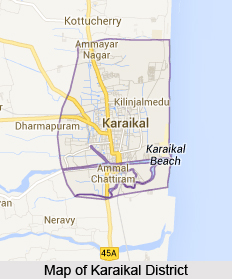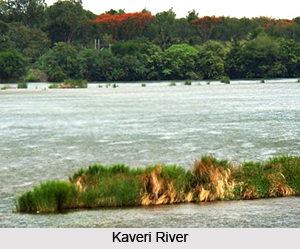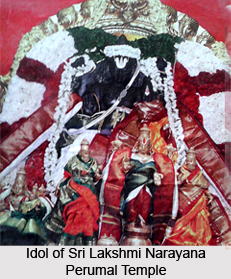 Karaikal District is one of the four administrative districts of Puducherry. Karaikal town about 16 km north of Nagappattinam and 9 km south of Tarangambadi is the regional headquarters. Karaikal region is embedded in the Nagappattinam District and Thiruvarur District of Tamil Nadu. Karaikal District lies between 10 degree 49 minutes and 11 degree 1 minute northern latitude and between 79 degree 43 minutes and 79 degree 52 minutes eastern longitude about 150 kms. Total area covered by Karaikal District is 161 sq km and has a population of 1,70,640 as per 2001 census. Karaikal region is made up of the Communes of Karaikal, Kottuchcheri, Nedungadu, Tirunallar, Niravi and Tirumalarajanpattinam.
Karaikal District is one of the four administrative districts of Puducherry. Karaikal town about 16 km north of Nagappattinam and 9 km south of Tarangambadi is the regional headquarters. Karaikal region is embedded in the Nagappattinam District and Thiruvarur District of Tamil Nadu. Karaikal District lies between 10 degree 49 minutes and 11 degree 1 minute northern latitude and between 79 degree 43 minutes and 79 degree 52 minutes eastern longitude about 150 kms. Total area covered by Karaikal District is 161 sq km and has a population of 1,70,640 as per 2001 census. Karaikal region is made up of the Communes of Karaikal, Kottuchcheri, Nedungadu, Tirunallar, Niravi and Tirumalarajanpattinam.
History of Karaikal District
Several explanations are offered for the name Karaikal. There is no doubt that it is a combination of two words, `karai` and `kal`. Both `karai` and `kal` have numerous meanings, of which the more plausible one being `a canan made of lime mixture`. According to Julien Vinson, the town is said to have been known as Karagiri in Sanskrit language. Karaikal area formed an integral part of the Pallava Dynasty in the 8th century (CE 731-796).
 Geography of Karaikal District
Geography of Karaikal District
Geography of Karaikal District forms a part of productive Kaveri delta, which is totally enclosed by the tributaries of Kaveri River. Karaikal District is located on the east coast of the country, in the deltaic region of Kaveri River, and thus it experiences a tropical climate with minimum variation in temperature and reasonable rainfall. Average annual rainfall of Karaikal District is about 126 cm. This district is abundant in mineral resources as well as flora and fauna.
Economy of Karaikal District
Economy of Karaikal District is dependent on agriculture. Situated in the Kaveri delta, the irrigation facilities of this district permit the cultivation of rice over large areas. Sugarcane is also cultivated here but only as a subsidiary crop. The cultivation of millets is very little or practically nil. Karaikal region lies in the fag end of Kaveri Delta. Main source of irrigation is river water by canal system. Other sources are deep bore wells and filter points. In addition to paddy crop, pulses, cotton, groundnut, banana and vegetables are also encouraged. Karaikal region has 10 fishing hamlets.
Culture of Karaikal District
This district has a very interesting language composition. This is primarily due to the scattered location of the regions. People of different religions reside in Karaikal district. Although it is not known how long and to what extent this fourfold classification was adhered to in practice in the areas that now fall under this territory, it may be assumed that the four fold division of society in accordance with the Hindu Shastra continued to be respected even during the Chola days. Many new castes found a place in the social strata of Karaikal region. Interestingly, the French having come here originally as traders did not interfere in matters of customs and practices.
 Even after they established themselves as the rulers of the land they allowed the natives to maintain good relations with them.
Even after they established themselves as the rulers of the land they allowed the natives to maintain good relations with them.
Tourism in Karaikal District
Karaikal District is one of the prominent tourist attractions of southern India. There are several temples in this district of Puducherry that are worth visiting and attract people from far and wide. Jadayupureeswarar Temple, Sri Lakshmi Narayana Perumal temple, Sri Kodeeswaramudayar temple, Sri Uppilamaniar Temple, Sri Kailasanathar Temple, Nitya Kalyanaperumal Temple, Karaikal Ammaiyar Temple, Sri Parvatheeswaraswami Temple and Sri Kothandaramaswami temple are some of the main attractions of Karaikal District.
Other infrastructure of Karaikal District includes an Agriculture College and Research Institute, Vocational Agricultural School and a Krishi Vigyan Kendra have been established. Several Veterinary Hospitals and Dispensaries are also there in this region.






